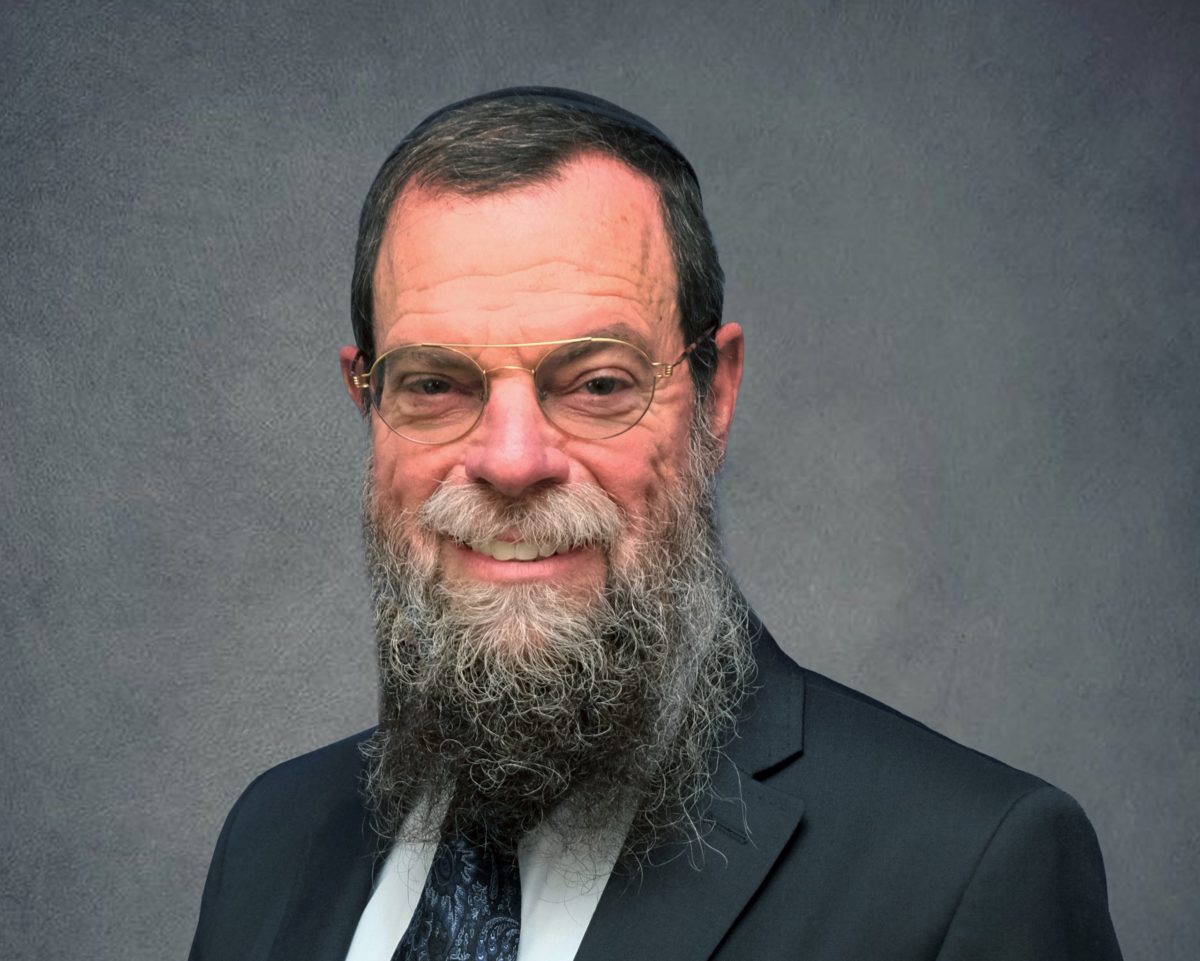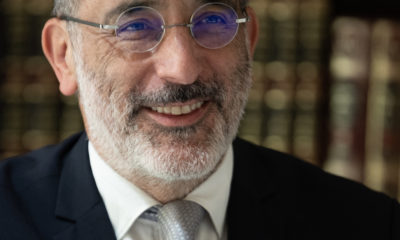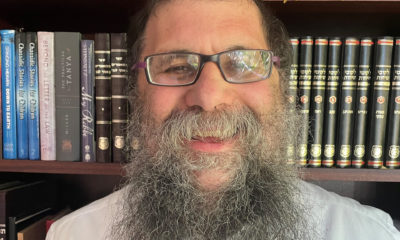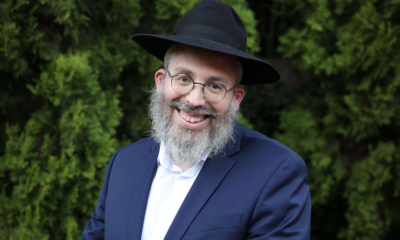
Religion

Feeling free – no matter what!
Published
1 year agoon
I still remember a particular radio advert from my youth. It was for Salem menthol cigarettes – a jingle to the words, “You can Salem out of the country, but, you can’t take the country out of Salem!”
Some have argued that “You can take the Jews out of Egypt [and slavery], but you can’t take the Egypt out of the Jew!”
They maintain that the “slave mentality” became ingrained in our national psyche.
Yet, back in the 16th century, the saintly Maharal of Prague argued differently. Rabbi Judah Lowe was a saint, mystic, halachist, philosopher, and chief rabbi of Prague. There’s even a statue of him outside Prague’s City Hall to this day.
The Maharal writes that not only did the Jews not inherit a slave mentality from Egypt, but the very opposite. The Exodus forever changed the inner identity of the Jew. The Exodus set us free, not only physically and politically, but spiritually and psychologically. Ever since the Exodus, every Jew is innately free.
The Exodus wasn’t just a one-off historical event or a fantastic, dramatic story of our national independence that we retell every year at our Pesach seders (or that inspired Steven Spielberg to produce The Prince of Egypt).
No. The Exodus was a spiritual revolution which changed the mentality, the mindset, the psyche, and the very nature of a Jew forever. We are, by definition, a free people, and nothing and no-one can ever change that.
And so, Pesach and the Exodus from Egypt which marked the very birth of our nation wasn’t just a political transformation but a spiritual transformation for the Jewish people and for every Jew until the end of time.
In 1927, the previous Lubavitcher Rebbe, Rabbi Yosef Yitzchak Schneersohn, then the acknowledged spiritual leader of Russian Jewry, fought the Communists tooth and nail. They were closing down Yiddishkeit in Russia, and he kept Jewish schools operating underground. With total commitment, he and his chassidim kept minyanim and mikvahs going clandestinely. Many paid with their lives, including my own wife’s two grandfathers.
The Rebbe himself was arrested and sentenced to death. But he was resolutely defiant, even in prison. Miraculously, his death sentence was commuted to 10 years in exile, to Kostrama, a few hundred miles from Moscow.
Leningrad, 1927. The Rebbe is on the train about to go into exile. Many hundreds of chassidim came to the train station to bid him farewell. In the crowd were Soviet police, KGB (state security) agents, and many Jewish informers. Knowing full well that every word he said would be reported to the Communist authorities, he said:
“May G-d be with us as He was with our ancestors; may He not forsake us nor abandon us. Only our bodies went into exile, but not our souls. We must proclaim openly before all that regarding any matter of our faith – Torah, mitzvahs, and Jewish custom – it’s not subject to the opinion of others, nor can any oppressive force be used against it.
“This is our request to the Holy One: May He not forsake us nor abandon us. G-d should give us true strength to be unintimidated by physical pain, on the contrary, to accept it with joy, so that every punishment we receive for supporting a cheder, for learning Torah, for performance of mitzvahs, shall increase our fortitude in the holy work of strengthening Judaism.
“We must remember that imprisonment and hard labour are only temporary things, whereas Torah, mitzvahs, and the Jewish people are eternal.”
Powerful stuff! What courage, defiance, and faith!
What was the Rebbe’s bottom-line message? Only our bodies went into exile, but not our souls! They may imprison and enslave our bodies, but the soul of a Jew can never go into exile. The soul of a Jew is always free!
And, indeed, he outlasted them.
After only 10 days in exile, the Rebbe was released and allowed to leave Russia. He spent time in Riga and in Poland and in 1940, again with miracles, he came to the United States where he re-established Chabad until his passing in 1950.
Not only was he echoing the words of the Maharal, he was living them.
During World War II, in the midst of the Holocaust, from the death camps, emerged a young man trained as a psychotherapist, who from his own extreme circumstances in the camps was able to identify an intangible spirit that helped many Jews survive their most harrowing ordeals. Dr Viktor Frankl, the author of Man’s Search for Meaning, which has sold many millions of copies in many languages, gave voice to his own experience in the camps and reported that he had discerned that it was mainly the people who had a sense of meaning and purpose in life who had a better chance of survival at Auschwitz.
And his Holocaust experience taught Frankl a lot about freedom too. In his words,
“Our greatest freedom is the freedom to choose our attitude to any given situation. There are always choices to make. Every day, every hour, offered the opportunity to make a decision. Would you submit to those powers which threatened to rob you of your very self, of your inner freedom, which determined whether you would become a plaything to circumstance, renouncing your freedom and dignity.”
According to Frankl, of those who survived, many made that very decision – not to renounce their freedom and dignity, no matter what.
So, says the Maharal, every Jew possesses that innate freedom.
On Thursday, 2 April 1970, an Israeli Phantom Jet fighter was shot down over Syria. The pilot, 26-year-old Pini Nahmani, was imprisoned in the Al Mazza jail in Damascus.
He was later exchanged in a prisoner swap with the Syrians. Pini writes about his time in prison. When Pesach was approaching, he and his two fellow Israelis in jail prepared for a seder. They scrubbed the floor; they painted a seder plate on a piece of cardboard. They had two haggadahs and some matza from the chief rabbi of Zurich. Boaz, the youngest, asked the Ma Nishtana (Four Questions). They ate matzah and they sang. They sang all the songs of their youth, all their favourite Pesach songs. They sang so loud, the prison guards warned them to tone it down or they would go into solitary confinement. But they ignored the guards. They felt free, and they kept singing as loud as they could.
Nahmani would later write that in his whole life, his most memorable seder, his most inspirational seder, was the seder he celebrated in a Damascus prison. Ironically, where was he most free? In prison!
It doesn’t matter where or in what circumstances we find ourselves, a Jew is innately and eternally free.
- Rabbi Yossy Goldman is the life rabbi emeritus at Sydenham Shul, and president of the South African Rabbinical Association.











Jonathan Fishman
Apr 10, 2023 at 6:15 pm
It is not appropriate to suggest that Holocaust victims who did not survive did not have meaning in their lives or gave up. It is important to understand that the Holocaust was a horrific genocide that targeted and murdered millions of innocent people, including Jews, Romani people, disabled individuals, and many others. Many victims of the Holocaust were subjected to unimaginable suffering, starvation, and torture, and were often forced to work in inhumane conditions until they eventually died.
While it is true that some individuals, like Viktor Frankl, may have found meaning and purpose in their lives even in the face of unimaginable horror, this does not mean that those who did not find such meaning were somehow lacking. The experiences of those who survived the Holocaust cannot and should not be used to judge those who did not.
It is also important to note that survival in the Holocaust was often a matter of luck, rather than a reflection of an individual’s inner strength or determination. Many people who were subjected to the same conditions as those who survived did not make it through, and it is not appropriate to suggest that they simply gave up or lacked meaning in their lives.
Ultimately, it is important to honor the memory of the millions of victims of the Holocaust and to acknowledge the unimaginable suffering they endured. It is not appropriate to use the experiences of a few survivors to make judgments about those who did not survive.